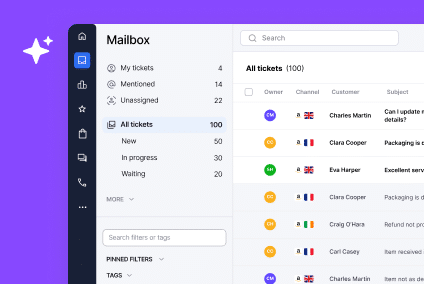Choosing the right AI tools for your online store feels overwhelming. So, we’ve tested dozens of platforms on your behalf, and narrowed them down to five that deliver results …without requiring a Data Science degree.
These tools handle everything from customer support to product recommendations – they save time, reduce costs, and help you compete with larger retailers. Here, we’ll break down what each one does best and who should use it.
Why AI Tools Matter for eCommerce in 2026
AI adoption in eCommerce moved from experimental to essential in 2025. The global AI-enabled eCommerce market reached $8.65 billion in 2025, and 77% of eCommerce professionals now use AI daily.
The numbers tell a clear story. 84% of eCommerce businesses are either integrating AI or planning to do so – stores using AI-powered chatbots saw a 25% increase in lead conversions in 2025. Product recommendations alone drive up to 31% of revenue for retailers who implement them properly.
Three key benefits drive this adoption:
Automation reduces costs. AI handles routine tasks like ticket routing and inventory forecasting without adding headcount. Companies report 30% lower support costs while handling twice as many inquiries.
Personalization increases sales. AI-powered product recommendations can increase revenue by up to 300%, raise conversion rates by 150%, and boost average order value by 50%. Amazon attributes 35% of its sales to AI recommendations.
Predictive analytics improves decisions. AI tools forecast demand, optimize pricing, and identify trends before competitors notice them.
The technology reached a tipping point. 78% of organizations now use AI in at least one business function, up from 55% a year earlier. This shift happened because AI delivers measurable results, not because of hype.
For online sellers, the question isn’t whether to adopt AI. The question is which tools solve your specific problems.
eDesk: Best for Customer Support Automation
eDesk specializes in AI-powered customer support for eCommerce businesses. The platform consolidates messages from multiple channels into one interface and uses AI to route, prioritize, and draft responses.
Key features include:
Omnichannel inbox that combines messages from Amazon, eBay, Shopify, social media, and email into one view. AI automatically links conversations to the correct orders and customer histories.
Smart ticket routing sends inquiries to the right team member based on topic, language, and urgency. The AI learns from your team’s patterns and improves routing accuracy over time.
AI-assisted responses analyze incoming messages for sentiment and intent. The system suggests appropriate replies based on your past conversations and brand tone. Support agents edit these drafts rather than writing from scratch.
Performance analytics track response times, resolution rates, and customer satisfaction scores across all channels. The dashboard identifies bottlenecks and highlights areas for improvement.
Best for: Growing eCommerce businesses that sell across multiple marketplaces and need to scale support without proportionally scaling headcount. Works particularly well for teams handling 100+ tickets per day.
eDesk integrates with major eCommerce platforms and marketplaces. The AI understands eCommerce-specific contexts like refunds, shipping delays, and product variations. This specialization makes it more effective than general-purpose helpdesk software for online sellers.
The platform offers flexible pricing based on ticket volume. Smaller stores start with basic plans while larger operations access advanced automation features. Free trials allow you to test the system with your actual support volume.
Learn more about AI-powered customer service tools
Shopify Magic: Best Built-in AI for Online Stores
Shopify Magic brings AI capabilities directly into the Shopify admin interface. Store owners access AI features without installing separate apps or managing additional subscriptions.
Core capabilities include:
Product description generator creates optimized copy from basic product details. You input specifications and features. The AI produces SEO-friendly descriptions that match your brand voice.
Image editing tools remove backgrounds, adjust lighting, and resize product photos. The AI handles batch processing for entire product catalogs.
Smart recommendations surface relevant products to shoppers based on browsing behavior and purchase history. The system learns from your store’s data to improve suggestions over time.
Email subject line optimization tests multiple variations and predicts which will generate higher open rates. The AI considers your audience’s past engagement patterns.
Best for: Shopify merchants who want AI functionality without technical setup or separate tool management. Particularly valuable for solo founders and small teams running their first online store.
Shopify Magic works exclusively within the Shopify ecosystem. This limitation becomes an advantage if you already use Shopify. The integration is seamless because the AI accesses your full store data natively.
The tool comes included with Shopify subscriptions – no separate payments or contracts required. Features roll out gradually as Shopify expands the platform’s AI capabilities.
Explore AI helpdesk options for Shopify stores
Klevu: Best for AI-Powered Search and Merchandising
Klevu transforms how shoppers find products on your site. The platform uses natural language processing to understand search intent, not just keyword matching.
Primary features include:
Semantic search interprets what customers mean, not just what they type. Searches for “running shoes for flat feet” return appropriate results even if those exact words don’t appear in product titles.
Auto-complete suggestions appear as shoppers type. The AI predicts intended searches and surfaces popular products immediately.
Personalized ranking adjusts search results based on individual shopper behavior. Returning customers see results weighted toward their preferences and past purchases.
Visual merchandising tools let you set rules for which products appear first in specific categories or searches. The AI enforces these rules while still personalizing results for each visitor.
Analytics dashboard shows search terms that return no results, popular queries, and conversion rates by search phrase. This data reveals gaps in your catalog and opportunities to improve product listings.
Best for: Mid-size to large eCommerce stores with extensive catalogs where product discovery becomes challenging. Most effective for stores with 500+ products and meaningful traffic volume.
Klevu works across multiple eCommerce platforms, including Shopify, BigCommerce, and Magento. Implementation requires technical setup but doesn’t demand custom development for standard use cases.
Pricing scales with your site traffic and catalog size. The investment makes sense when imporved search directly impacts conversion rates, which typically happens at higher traffic volumes.
Jasper: Best AI Content Generator for eCommerce Marketing
Jasper produces marketing copy at scale. The platform generates ad text, email campaigns, product descriptions, and landing page content using large language models trained on high-converting examples.
Core functionality includes:
Campaign templates for common eCommerce scenarios like product launches, seasonal promotions, and abandoned cart emails. You input basic details. Jasper generates complete campaign copy across multiple channels.
Brand voice customization trains the AI on your existing content. The system learns your tone, vocabulary, and style preferences. Output matches your brand without extensive editing.
A/B testing integration generates multiple variations of headlines, calls to action, and body copy. You test these variations to identify the highest-performing messages.
SEO optimization mode writes content targeting specific keywords while maintaining readability. The AI balances search optimization with natural language.
Multi-language support translates and adapts content for international markets. The tool handles localization nuances beyond direct translation.
Best for: Marketing teams and agencies managing content for multiple brands or campaigns. Most valuable when you need to produce high volumes of varied content consistently.
Jasper doesn’t integrate directly with eCommerce platforms. You export generated content to your store, email platform, or advertising accounts. This separation means more manual work but allows use across any marketing channel.
The platform charges monthly subscription fees based on word count limits. Heavy users need higher-tier plans. Free trials let you test whether the output quality justifies the cost for your needs.
Revieve: Best for Visual AI and Personalized Shopping
Revieve specializes in visual AI for beauty and fashion retailers. The platform analyzes photos to provide personalized product recommendations based on individual characteristics.
Key capabilities include:
Skin analysis evaluates uploaded photos to identify skin type, concerns, and conditions. The AI recommends products suited to the individual’s specific needs.
Virtual try-on lets shoppers see how makeup, hair color, or accessories look on their own photos. The visualization reduces uncertainty and returns.
Personalized routines suggest complete product sets based on the analysis. Instead of single items, shoppers receive curated regimens addressing their specific concerns.
Progress tracking monitors changes over time for shoppers who upload new photos periodically. This feature builds engagement and demonstrates product effectiveness.
Diagnostic questionnaires combine with visual analysis to refine recommendations. The AI considers both objective visual data and subjective user input.
Best for: Beauty and fashion brands where visual matching and personalization drive purchase decisions. Most effective for cosmetics, skincare, hair care, and eyewear retailers.
Revieve requires integration with your eCommerce platform and product catalog. Implementation involves technical setup and mapping your products to the AI’s recommendation engine.
The platform works best with established brands that have comprehensive product lines. Shoppers expect multiple relevant recommendations, which requires sufficient inventory depth.
Pricing follows an enterprise model with custom quotes based on traffic volume and feature requirements. The investment makes sense for brands where personalization significantly impacts conversion rates and reduces returns.
Read about conversational AI in eCommerce
Comparison Table: Which Tool Fits Your Store
| Tool | Best For | Key Features | Ideal Users |
| eDesk | Customer support | AI ticketing, omnichannel integration, sentiment analysis | SMBs to Enterprises selling on multiple channels |
| Shopify Magic | Storefront automation | Product descriptions, image editing, recommendations | Shopify merchants, solo founders |
| Klevu | Smart search | NLP search, personalized results, merchandising | Mid-size to large stores with 500+ products |
| Jasper | Content creation | Ad copy, brand tone training, A/B testing | Marketing teams, agencies |
| Revieve | Visual personalization | Skin analysis, virtual try-on, routines | Beauty and fashion brands |
How to Choose the Right AI Tool for Your Business
Start with your biggest operational bottleneck. AI tools deliver the most value when they solve expensive or time-consuming problems you already face.
Evaluate tools based on these criteria:
Integration requirements determine implementation difficulty. Tools that connect directly to your existing eCommerce platform require less technical work. Standalone solutions offer flexibility but demand more integration effort.
Scalability matters if you plan to grow. Some tools work well for small operations but become expensive or cumbersome at scale. Others require minimum traffic or transaction volumes to function effectively.
Support and training affect adoption success. Consider whether the vendor offers implementation assistance, documentation, and ongoing support. Teams adopt tools more readily when help is available.
Data requirements vary by tool. AI-powered recommendations need transaction history to work well. Visual AI requires product images. Make sure you have the necessary data before committing.
Create a testing framework:
Define specific metrics you’ll track during a trial period. Generic “it works better” assessments fail to justify ongoing costs.
Run pilots with actual workloads, not artificial test scenarios. Real customer data reveals limitations and benefits that don’t appear in demos.
Involve team members who will use the tool daily. Their feedback on usability and workflow integration matters more than executive impressions.
Calculate return on investment based on measurable improvements. Time saved, conversion rate increases, and cost reductions justify tool subscriptions better than subjective quality assessments.
Discover automation tools that save time and money
Future Trends in AI for eCommerce
The AI tools available today represent just the beginning. The next five years will bring more sophisticated capabilities that fundamentally change how online stores operate.
What’s Coming in the Short Term (2026-2027)
Agentic AI represents the biggest trend on the horizon. These are AI agents that work autonomously, using large language models and machine learning to not only carry out tasks but also reason and learn. Unlike current tools that need instructions, these agents identify problems and solve them independently.
Examples of what this means for your store:
An AI agent notices your inventory running low on a trending product and automatically reorders from your supplier based on sales velocity and seasonal patterns.
Customer service agents that don’t just answer questions but resolve complete issues. They process refunds, update shipping addresses, and escalate complex problems without human involvement. AI is projected to handle 80% of all customer interactions by 2030.
Deeper cross-channel integration becomes standard. Your AI tools share data seamlessly. When a customer browses products on mobile, abandons their cart, and later contacts support, the system knows the complete history and personalizes every interaction accordingly.
Medium-Term Developments (2027-2030)
Predictive commerce anticipates needs before customers articulate them, enabling real-time operational adjustments. Your store won’t just respond to what customers do. It will forecast what they’ll want next week.
Voice commerce expands beyond simple reordering. When someone asks “What’s the best eco-friendly washing powder?” these moments provide predictive insights about immediate and future buying behavior. The AI feeds these queries into decision systems that adjust inventory, trigger personalized offers, and inform cross-selling opportunities.
Hyper-personalization moves beyond product recommendations. Companies that excel at AI-driven personalization generate 40% more revenue than those that don’t. AI agents can hyper-personalize search results by taking every click, search, purchase, return, and preference into consideration. This extends to pricing, delivery options, payment methods, and even store layout for each visitor.
Staying Ahead Without Getting Overwhelmed
These advances sound intimidating. The key is approach, not technology mastery.
Start with curiosity over certainty. You don’t need to understand how AI works technically. You need to understand what problems it solves for your customers. Test new tools when they address real friction points in your business.
Adapt incrementally. Companies that try to implement every new AI feature simultaneously often fail. Pick one area where AI delivers measurable improvement. Master that. Then expand to the next area.
Focus on customer outcomes. The best AI implementations are invisible to shoppers. They just experience faster service, better product matches, and smoother transactions. If your AI tools impress technically but frustrate customers, you’ve chosen wrong.
Build learning into your operations. Assign someone to monitor AI developments in eCommerce. Follow industry publications. Test beta features when they become available. Retailers who wait until trends become mainstream miss the competitive advantage early adoption provides.
The stores thriving in 2030 won’t be the ones with the most AI tools. They’ll be the ones that thoughtfully applied AI to their specific customer problems and continuously refined their approach based on results.
Explore the future of AI in customer service
Ready to Transform Your eCommerce Operations?
AI tools moved from experimental to essential for online retailers in 2025. The platforms covered here address different operational needs, from customer support to product discovery to marketing content.
Your specific requirements determine which tools make sense. eDesk excels at centralizing and automating customer support across multiple sales channels. Shopify Magic offers the easiest entry point for merchants already on that platform. Klevu transforms product discovery for stores with extensive catalogs. Jasper accelerates marketing content production. Revieve creates personalized shopping experiences for beauty and fashion brands.
Start with the tool that addresses your most expensive or time-consuming problem. Test it with real workloads. Measure specific improvements. Expand to additional tools as you prove value and build internal expertise.
The stores succeeding in 2026 aren’t using every AI tool available. They’re using the right ones strategically.
Take a free trial of eDesk’s AI-powered features and see how automation transforms customer support for growing eCommerce businesses.
FAQs
What is the best AI tool for eCommerce in 2026?
The best tool depends on your specific needs. eDesk leads for customer support automation. Shopify Magic works best for Shopify merchants seeking built-in functionality. Klevu excels at search and merchandising for larger catalogs. Choose based on your operational bottleneck.
How does eDesk improve customer support?
eDesk consolidates messages from multiple channels into one interface and uses AI to route tickets, analyze sentiment, and draft responses. Support teams handle more inquiries faster without adding headcount. The AI learns from your team’s patterns to improve over time.
Do AI tools integrate with Shopify and WooCommerce?
Integration varies by tool. Shopify Magic is native to Shopify. eDesk and Klevu offer integrations for both platforms. Jasper operates independently and requires manual content transfer. Check specific integration capabilities before committing to a tool.
Are AI tools affordable for small eCommerce businesses?
Many AI tools offer tiered pricing based on usage. Shopify Magic comes included with Shopify plans. eDesk and others provide starter plans for smaller operations. Free trials let you test value before paying. Start with one tool addressing your biggest problem rather than multiple subscriptions.
How long does it take to see results from AI tools?
Customer support and search tools show results within weeks as the AI learns from your data. Content generation tools work immediately but require time to refine brand voice. Personalization tools need transaction history to improve recommendations. Most tools deliver measurable improvements within 30 to 90 days.
What is agentic AI, and when will it affect my store?
Agentic AI refers to systems that work autonomously to solve problems without constant human direction. These tools not only complete tasks but also reason through challenges and learn from outcomes. Early versions are available now for customer service and inventory management. Expect wider adoption across eCommerce by 2027.




